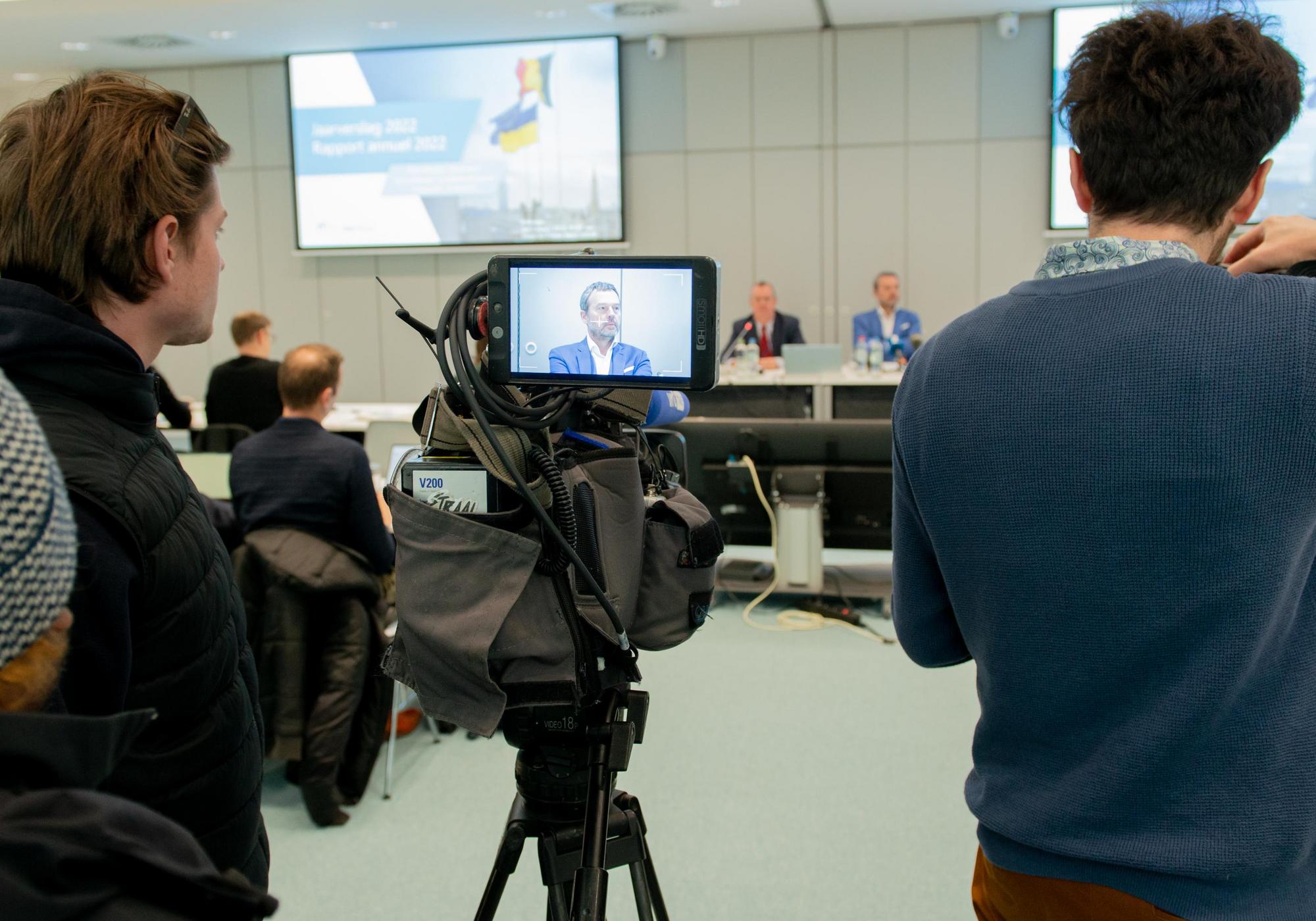The Bank's annual pièce de résistance

One of the NBB’s roles is to make our expertise available to the country, in a completely independent manner, so as to contribute to public debate and discussion on the economy and the challenges facing policymakers. We do so frequently throughout the year, including via articles and analyses, economic projections and interviews by the governor and board members. But the crowning achievement of this “outreach” is and remains the National Bank’s annual report, which we traditionally publish in late February or early March of each year.
The exception to the clean desk policy
A well-known economic journalist from a major newspaper told us a while ago that there is one document he leaves on his otherwise very tidy desk all year round because it serves as such an authoritative reference. That work is, you guessed it, the Bank’s annual report.
One of the NBB's roles is to make our expertise available to the country, in a completely independent manner, so as to contribute to public debate on the economy and the challenges facing policymakers.
Everyone invariably refers to the “annual report”, but the official name of this hefty tome is “Report and preamble on economic and financial developments, prudential regulation and supervision”. Don't be put off by the long title. In practice, the report provides a comprehensive analysis of global, European and Belgian macroeconomic developments.
In seven chapters, our economists interpret the main economic developments and identify points for attention by policymakers. We provide recommendations to policymakers regarding which problems are pressing and should be addressed. In this way, we aim to contribute to public debate and provide information for discussion and reflection. Our analyses also help inform political choices to tackle the challenges facing Belgium, for example in relation to public finances, the labour market, education, trade and industry, business and infrastructure investment, inflation and purchasing power, saving and consumption, wage costs and competitiveness, the housing market, sustainability and environmental challenges, and so on.
State of the Union
The preamble, or introduction to the report, is a bit like the Bank's annual State of the Union address. It is discussed at length with the Council of Regency, which includes representatives of many socio-economic actors in the country, prior to publication. Some regents may disagree with certain recommendations or conclusions. In that case, this is mentioned in a footnote to the preamble. If you haven’t followed the economic news for a year or are unfamiliar with the financial and economic challenges we are all facing, you will be completely up to speed after reading the preamble.
The report itself also delves into the challenges we face as a banking supervisor and resolution authority. In doing so, it details new regulations, digitalisation processes, focus areas and the many tasks we perform in this role.
A Herculean task
Producing the report requires mammoth efforts from dozens of economists and experts. The first discussions on content take place in the autumn; these are followed by analyses and preliminary drafting, internal discussions on the points we wish to emphasise, the creation of statistics and infographics, and graphic design and translation work. Around 100 staff are directly involved in this process.
Automatic wage indexation may have dulled the effects of inflation in the country for households, but the government and business are paying a price for this uniquely Belgian system.
This year’s report totals 340 pages. We agreed on an embargo with the press, giving journalists two days to work the content into print, broadcast and online coverage. The key message this year is that Belgium weathered the turbulent past year quite well, despite the energy and Ukraine crises and high inflation. Automatic wage indexation, which ensured that consumer purchasing power was for the most part maintained, and a dynamic labour market undoubtedly helped.
Unfortunately, however, these crises meant that governments paid too little attention to structural problems such as high public debt, the far too low employment rate, the impact of population ageing and so on. These issues urgently need to be addressed, the governor warns. Automatic wage indexation may have dulled the effects of inflation for households, but the government and business are paying a price for this uniquely Belgian system. This has made Belgian firms less competitive than their counterparts in neighbouring countries, which is a major concern.
The key message this year is that Belgium weathered the turbulent past year quite well, despite the energy and Ukraine crises and high inflation.
Video episodes and a roadshow
Interested in reading the report, which of course covers many other topics? You can find it here. Short on time? For some years now, we have made concise videos in which the governor and our experts walk you through the highlights of the report. Please note that the report is currently available in French and Dutch; the English version will be published on 10 April.
But we have an even better option for those seeking a brief overview of our annual report. In March, we will be presenting the report in towns and cities throughout Belgium. Everyone is welcome to attend (free of charge). This year’s roadshow is the resumption of a pre-pandemic tradition that attracted thousands of attendees every year. While this requires a significant investment by the Bank, we feel it is our obligation to society. We wish to foster communication and engage in dialogue outside the confines of our Brussels headquarters. The presentations are usually given by a member of our board of directors. Each presentation is followed by a reception, to allow attendees to ask questions and network in an informal setting. More information on the roadshow can be found here.

